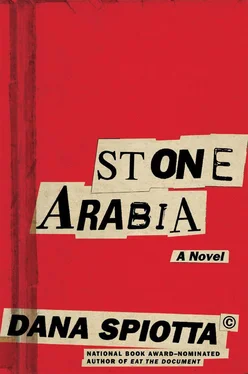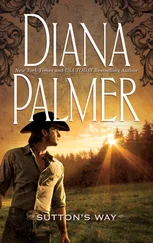Jay slept over, which he did now once every week or so. It had become a regular thing, not increasing or decreasing in intensity or frequency. It held. We had slow, easy sex that had a low-volume erotic tone. We weren’t in love — even the idea of that made us both skittish and nervous — but the physical pleasure was real and steady and welcome.
Knowing I would see Jay once a week also helped me keep some minimum level of grooming: I shaved my legs, I did my nails, and nearly regularly did my pilates DVD. I first met him at the Farmers Market on Fairfax, which is near where I work as a secretary for Greer Properties. I mean office manager. I mean personal assistant.
It was at Du-par’s, an old coffee shop where I eat lunch a couple of times a week. I used to occasionally see Jay there, reading. One day, on my way out, he asked if he could have lunch with me the following day. Jay wasn’t a good-looking guy. He was in his mid-fifties, balding, and he wore sweaters that were too big for him and created an off-putting, almost creepy diminutive effect. Nevertheless, he did have a faded British accent. I said yes.
We agreed to meet at the same place. As soon as I sat down with him, I regretted it. The whole thing felt so awkward, and now this coffee shop would be forever poisoned with failure. I’d have to eat somewhere else. We ordered and then sat in forced smiles and silence. I became very conscious of how often I seemed to blink. I drank too much coffee and then I began to talk, and talk, filling the empty air.
“Have you been following the severe acute respiratory syndrome global pandemic? You know, SARS? Well, you remember how at the beginning of the year it was constantly in the news? Every time you turned on the news they were talking about it. All winter long we heard about where it was and what could be causing it. We saw people in hospital beds on respirators next to photos of them healthy and smiling at a barbecue. Interviews with family members and CDC officials. Remember? Well, then SARS just stopped for no reason. Do you know there were over seven thousand cases?” I said, leaning in.
Jay nodded politely. I believe I mentioned “corona virus” and “etology” and “case-fatality ratios” and I didn’t stop. I hadn’t been out with a guy in a long time, but even I knew talking about infectious diseases was not appealing first-date conversation. I finally took a breath and he looked uncomfortable.
“What do you do?” I asked, my whole person collapsing in weary resignation as I asked this ridiculously boring question. This was exactly why I stopped dating. This was why I wanted to stay with my husband long after I realized he was unhappy. So I wouldn’t have to ask and answer these sorts of questions.
“I’m a teacher,” he said.
“Oh, that’s great. What do you teach?” I said. To me, asking and answering these questions implied a false promise about the future. Telling your life history meant you were throwing it out for someone’s perusal, and how optimistic could you feel? How could anyone “get” me at this point? I made no sense, especially in light recitation.
“I teach art history. And sometimes film. At Wake School. Do you know it?”
I shook my head.
“It’s a private high school for rich industry kids. Mostly. They do give some financial-need scholarships to gifted kids.”
It was my turn, and I found myself speedily talking about Ada and her life in New York. And I knew I now sounded like a woman who lived through her daughter, but I guessed that was better than the woman I was a minute earlier who loved to talk about SARS. I was just about to launch into describing my dying mother and her approaching dementia and my own fears of age-related memory impairment when I stopped. I just stopped myself. I took a sip of water, a deep breath, and I let the silence hang there. I even stopped smiling.
At last he said, “You have the loveliest hands,” and he put his hand, or just the fingers of his hand, very gently on top of the fingers of my hand. I could feel my cheeks getting warm. I stared stupidly at our hands on the table. At last I looked up, and he was looking right back at me. I made myself hold his gaze for a second, and I could feel an unmistakable wave of desire move through my hand and across my body. I had to shift a bit in my seat, even, and I was amazed at how a man who didn’t seem sexy at all could suddenly become starkly erotic just by plainly admitting his desire. Was it always like that? I didn’t think so. I think it had a lot to do with the many pointless bad dates I had after my second husband, Will, left me (I refer to him as my second husband, but I never actually married Ada’s father, Chris, so Will is in fact my one and only husband, or he was before he left me). I went through setups and contrived dinner parties and even an online dating service. How difficult and humiliating it was to discover a man wasn’t really attracted to you. There was a time when a man’s attraction was a given, and that time had passed. I stopped trying to date after barely a year. It had, I’m afraid, been a long time. Sitting there, with his hand on mine, staring me into desiring him, felt good — quietly, dizzily good.
I would have liked to do something then, but. “I have to go back to work,” I said. I gently pulled my hand back toward me. He let go.
“What work do you do?”
“I’m a personal secretary. Or assistant. An office manager for Greer Properties. A sort of personal assistant to Jack Greer.” The Greer family had real estate holdings all over Los Angeles. They owned land from pre-Hollywood time, orange-grove time. They were even related to Henry Gaylord Wilshire on his mother’s side. Wilshire used to own property from West Hollywood down to what would become Wilshire Boulevard, which he planned to develop from a barren field into a grand street named after himself. He donated the property to the city in the 1890s. Henry Gaylord Wilshire frequently ran for office as a socialist and eventually lost everything; Jack’s money came from his father’s unsocialist grandfather, Lymon Greer.
I have been working for Jack Greer for fifteen years. I do everything for him, from making lunch dates to getting his dry cleaning. I answer letters and return phone calls. I distill the important request from the nuisance or the extraneous and then deliver it to the attention of Jack. But mostly I just have a long-built instinct for what he wants to hear about. I do, however, have to be there without fail, to filter and distill. No spontaneous late lunches for me.
Jay smiled and nodded. Not that interested in hearing more, which was fine because I wasn’t all that interested, either.
He came over for dinner that night. It would be a long drive for him. I lived across the Valley and way into the tired desert hills of Santa Clarita. He lived near the Farmers Market, on Ogden Drive. Already we were doomed, we had a commute between us. But he didn’t complain, and arrived on time. He did not bring me a Thomas Kinkade Painter of Light ™item that evening. That would be saved for our next date. We ate grilled fish with aioli and drank a steely and unsentimental summer wine. We talked about Nicholas Ray’s hard-to-see film Bigger Than Life, in which high school teacher James Mason takes the newfangled cure-all drug cortisone and then becomes sweaty and distorted and psychotic. He loves Nicholas Ray and I love James Mason, so we found common ground in Bigger Than Life. Because it hadn’t made it to DVD, it had attained a cult cachet among film fanatics. Jay — no surprise there — was a devoted cineaste, particularly of the highly wrought American films of the 1950s. Jay emerged from his car proudly wielding an old copy of the film on videotape, which I thought was a rather interesting date choice. Though no fanatic, I had seen Bigger Than Life at the Nuart years ago. Whatever it was to people in the fifties, or to the film fanatics of the moment, to me it read like a very earnest description of middle-class mortal desperation. It didn’t feel silly or campy, despite how melodramatic I found it. It truly disturbed me. It was a much more discomforting film of addiction than, say, The Man with the Golden Arm. It was about the creeping perversity of conventional life; it was, with its increasingly distorted close-ups and subjective angles, its blatant angry reds and hysterical atmospherics, a deeply unsettling film.
Читать дальше












